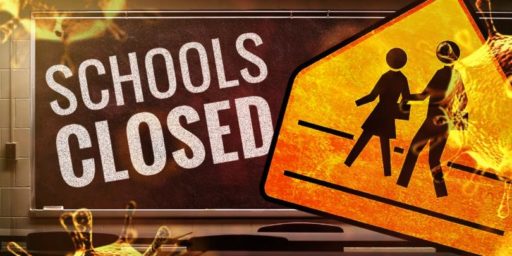Barely Trained Teachers Just As Good as Education Majors
Teach For America novices compare favorably to veteran teachers.
The Wonkblog headline “Teach for America teachers aren’t any better than other teachers when it comes to kids’ test scores” buries the lede.
A new study comparing test scores among elementary school students who had Teach for America instructors and who had other teachers finds it’s a wash.
The leaders of the controversial organization, which recruits graduates of selective universities and places them in classrooms after only several weeks of training, are pleased with the results. Chief executive officers Elisa Villanueva Beard and Matthew Kramer write online that the other teachers had an average of 13.6 years of experience, compared to only 1.7 years among the Teach for America group.
That smart, motivated folks with a crash course in pedagogy are as effective as seasoned teachers with four-year Education degrees (indeed, many would have advanced degrees) is rather damning of the traditional method of selection and preparation. Indeed, Max Ehrenfreund, the author of the piece, acknowledges this beginning in the third paragraph:
Teach for America was established on the premise that highly qualified young people could do as well or better than experienced educators in the nation’s most disadvantaged schools after only minimal training. While the organization has recently lengthened its training schedule and begun recruiting older people to teach as well, the results are arguably another vindication of Teach for America’s model. The group has become a focal point in the larger debate over whether the existing system of education colleges and certifications are doing enough to meaningfully prepare teachers for the classroom.
It’s a longstanding debate. While the requirements vary considerably from state to state, Education majors tend to be among the weakest on campus, as evidenced by standardized test scores and performance in core curricula. Here, though, Ehrenfreund mixes apples and oranges:
On the other hand, the fact that Teach for America’s teachers did no better than their more experienced colleagues in this latest study points to how difficult it is to improve students’ test scores by improving the quality of instruction. Other research has found that while a year spent in a gifted educator’s classroom can have a profound effect on a child’s career prospects, identifying those talented people is hard.
That should be a non sequitur. Teach For America novices shouldn’t stand out as “gifted educators” in a field of veteran teachers. That they do is a damning indictment of the latter.
The piece does got to some of the problems.
Seventy-six percent of the Teach for America staff had graduated from a selective college or university, as ranked by Barron’s, compared to 40 percent of the regular teachers. Eighty-four percent had majored in a field besides education, compared to 26 percent of regular staff.
Teach for America’s teachers were also much less likely to say they felt prepared for their first job and less likely to describe their training as useful in response to a survey.
And the Teach for America staff were less satisfied with their work in a number of ways. They were less likely to say that they felt camaraderie with their colleagues, and they rated the administrations of their schools and the professional caliber of the other staff less favorably. They were more likely to say that their work did not offer prestige, an intellectual challenge or opportunities for advancement. An overwhelming majority said they planned not to continue in teaching for their entire careers, compared to just a quarter of the regular staff.
[…]
Teachers in both groups did give similar responses when asked whether they felt they had a chance to help students succeed, both in and out of school, and whether they thought the job was personally fulfilling. Broadly speaking, though, the dissatisfaction in the Teach for America corps points to the difficulty of attracting well qualified, ambitious young people to an occupation with limited pay and professional autonomy.
I’ve been arguing for close to twenty years now that it’s shocking that we get as many talented people teaching in our primary and secondary schools as we do. The schools of Education not only have a poor academic reputation but emphasize rote memorization and conformity to the orthodoxy; that’s not a recipe for attracting our brightest minds. Those traditions are carried on in the workplace as well, so the most creative, innovative personalities are driven out. Those who persist despite all that are alienated from their colleagues.
The pay, frankly, isn’t the main issue. While teacher pay was horrendous thirty years ago, a vestige of the fact that it had long been a field dominated by women (who were presumed to either be in it only long enough to find a husband or to have a husband as the primary breadwinner), it’s quite competitive now* and still has the lure of reasonable hours, substantial vacation time, and extremely good job security and retirement benefits. The lack of autonomy is a real issue, though, in attracting and retaining talent.
UPDATE: Actually, not so much. While today’s salaries are indeed competitive, they have been for decades. The National Center for Education Statistics shows the national average salary rose from $8626 in 1969-70 to $15,970 in 1979-80, $31,367 in 1989-90, and 41,807 in 1999-2000, to $$56,383 in 2012-13. But that’s purely an artifact of inflation. In constant dollars, the salary has been remarkably steady over that period.
My perception is based on my home state of Alabama, where I graduated high school, completed all three degrees, and taught college. There, there has indeed been a significant real increase in teacher salaries over the years since I was in high school. In other states, such as Alaska, there has been a marked decline in real dollars.







I would tend to draw the conclusion that teachers are irrelevant to test scores. You know what’s relevant? Intelligence and motivation. Smart, motivated kids beat tests. Less smart but still motivated kids do okay on tests. Dumb kids or unmotivated kids get lousy test scores.
My math SAT – after scoring a D in geometry in 10th grade, then dropping out of school and only taking the SAT after I’d been out of school for a couple of years – was 610. (790 verbal because the test contained an error.) 610 isn’t stellar, but it’s hard to overstate just how incompetent I am at math, and how little I’d taken in school.
Tests test IQ first, knowledge second. Teachers? Meh.
I would think that the minimal impact of teacher quality on test scores suggests that test scores are, at best, a mediocre way to measure teacher quality (and possibly a poor one). You can have the best teacher in the world; it’s not going to make that big a difference if 1) they’re confined by a command-and-control education system that is constantly forcing them to rewrite everything to comply with the latest education fad; 2) the parents don’t give a damn.
@Hal_10000: Yes, it’s mediocre. In fact, there are no good ways to measure teacher quality.
Couple this with innumeracy, and you quickly wind up where metrics that are known to be irrelevant are used because “it’s all we have”. It’s not just teachers who are damned by this, either; in fact, this is extremely common.
How can teachers, other than the exceptional ones (which are rare birds by definition) have a significant effect on students within a system that is geared toward the minimum acceptable training at the lowest cost? My brief time teaching math and physics taught me that grad school wasn’t so bad after all, and that Michael’s take on how kids will get along is pretty much correct. Scholastic success has more to do with the other factors in a kid’s life outside of school, and the effect of the school experience itself has more to do with the system than the teachers.
The obvious counterpoint is that novice teachers have much less experience handling kids. It’s hard not to think that Teach of America teachers are steered to the better students and the veteran teachers are given the more difficult students. This would be reflected in the test scores. I can’t believe it’s the only explanation, though.
Personally, the Teach for America people I know are very driven and smart and it’s hard not to see how they are going be worse teachers than the person who majored in education. As someone I know who was forced to get a masters in ed said in an email: “It finally happened. A course on f—ing charts.”
When I was in high school in the early 70’s, I was taught by some who only had Associates degrees because that was all that was required back then. They were some of the most amazing teachers I ever had, no matter where I received education in later years.
The elite try to tell us that only they, the education professionals, with their doctorates and years of sitting on the sidelines adminstrating while others did the actual teaching, are capable of deciding who is best suited to teach our children. They have decided it must be others just like them and, frankly, they are failing and dragging our children down with them.
Of course, these are the same people who insist that everybody must have a college education of a particular type and this has led to a lack of qualified workers in the trades.
And I’m sure that robots can prepare Big Macs just as well as human workers. If all you want is to teach kids to regurgitat information on a test sheet before they forget it for life, then you could probably replace real teachers with members of the Ferguson Police Force — and then you wouldn’t need bulles to take the kids’ lunch money, since the cops would do that for them.
If you actually want to teach kids, well, that’s something different. But as the Republican party in Texas made clear a couple of years back, the last thing “conservatives” want is for kids to acquire critical thinking skills.
There also – sadly – is the fact that some education colleges are gateways to entrance for other colleges at universities with differing admission standards. For instance, an arts & science college may require a minimum ACT of 21, but the education college at the same university requires 18. (True fact.)
Once you’re admitted, transferring to a noncompetitive program – especially if you’ve managed a decent freshman year – is not difficult at all. Under performance based budgeting (*koffKasichkoff*), the education college is left scrambling for more students to replace exiting transfers, which puts/maintains downward pressure on their admission standards (“if we admit more, more will stay”). Meanwhile the arts & science college can maintain their higher minimum because they didn’t actually admit that 18 ACT student as a freshman and they can skim the cream off the top of the education college since the transfer students don’t get counted with entering freshmen.
To put it another way, some students are not entering education colleges because they want to teach.
The discussion about the quality of education in those education colleges is another discussion entirely.
I think you misread the paragraph about “gifted teachers”. It isn’t saying that the novices stand out. It’s saying that, contrary to what @michael_reynolds says in #1, there are a few teachers who have a big impact on test scores, but it’s really hard to figure out what they do and replicate it.
Alternate interpretation.
TeachAmerica gets bright and motivated people — the people who are going to naturally be pretty good teachers, and gives them a tiny bit of formal training so they can avoid the most common rookie mistakes.
Bright and motivated people are rare, however, and we can compensate for that with four years of education in education. It can’t make the graduates bright or motivated, but it can give them tools so they can perform at the same level as actual bright and motivated people.
I’m not saying that’s the right interpretation, I really don’t know. But, some of the best teachers I have had have been TAs in college, who have no training whatsoever.
@Jay L. Gischer:
No doubt. But the number of gifted teachers is tiny, and a kid can go all the way from kindergarten to graduation without meeting one. They are effectively irrelevant.
More to the point, the entire structure of education is outdated and an enormous waste of time and money and energy. I learned precisely nothing in school. I already read before I got to school and with that out of the way, the next 12 years (10 for me) was just going through the motions.
Now I have two kids in high school and it’s increasingly obvious that high school only teaches you to attend high school. You spend 4 years acquiring an amount of data you could pick up in four weeks on the internet, if you were motivated. And why? So you can have a piece of paper to wave in the face of a college admissions board which will usher you into a learning environment that’s a 10% improvement over high school and costs 100 K. Which you do so that you can wave another piece of paper in the face of an employer’s HR department. So you can get a job where not 10% of your college education is remotely relevant.
This clunky, absurd system might have been justified when “educators” had what amounted to a monopoly on learning. But hello, have you seen this new-fangled thing called the internet? Schools are like Macy’s competing with Amazon. Macy’s – no, we don’t have what you want, and if we did it wouldn’t be in your size, but feel free to walk around in circles before you escape to the nearest Starbucks. Meanwhile Amazon has all the sizes, all the colors, all the stuff.
Every single damned thing you’ve ever wanted to know is right there on your laptop, free! Free! 24 hours a day. All of it! Education should be about learning how to learn, how to incorporate this astounding resource. Education should be about finding what you care about, what you may be good at. Basically, education should be turned over to librarians, with the best teachers offering online lectures.
You know what would happen then? I wouldn’t have to drag my ass out of bed at 6:45 and drive to Larkspur, that’s what would happen. And the kids would probably end up knowing a lot more.
@Gustopher:
I get asked from time to time to teach writing or speak to a creative writing class. I avoid this like the plague because there is a fundamental disconnect between what I would say, and what the curriculum/teachers want me to say.
For a start I’d test students for imagination and verbal inventiveness. Takes five minutes, no paper needed. 1) Pick out a random couple in a coffee shop and make up stories about them. If that’s hard, you’re done. 2) Make a simple statement. Now rewrite that statement five different ways to put different spins on it. Can’t do it? Then you’re wasting your time in a CW class, go learn math.
I suspect people in other fields – people who do as oppose to teach – would have similar problems in squaring the circle between the curriculum and what they do in real life.
@michael reynolds: What’s bizarre is that we really don’t get to that point—teaching primarily how to learn rather than primarily information—until graduate school in our system.
At the primary school level, rote memorization is a very effective tool and shouldn’t be disparaged so glibly. Look at all these kids that can’t read well, and yet can sing tricky song lyrics. Get them to like the material and drill it in their heads and maybe they will get it.
@michael reynolds:
That would work great for bright and motivated children with educated parents.
@Grewgills:
It will work for most kids if we take the time to let them develop some interests and affinities, to see where their talent and inclination leads them. It’s not a race, or shouldn’t be. Why must student X at age Y be interested in topic Z? It’s nuts. At least in writing courses schools actively annihilate the one thing they cannot possibly write without: imagination.
My daughter is not great at academics, but she has some artistic talent, she certainly has style, and she’s great in the kitchen. Any help on any of those fronts from the school system? No.
Meanwhile my son with the genius IQ is flunking high school because he can’t force himself to go because it’s just. . . too. . . boring. Too regimented, too irrelevant, too hierarchical, too boring, too driven by absurdly high work loads.
You know what I wanted to do when I was in 10th grade? I wanted to stay home and read speculative fiction. A lifetime later, what do I do? I write speculative fiction. The outcome was only delayed by formal education. Had I staid in school longer they might have beat it out of me entirely and I could have spent my life doing some job I hated before finally swallowing a fistful of Ambien with a bottle of Scotch.
@Anonne:
Absolutely wrong. You don’t teach reading with rote, you teach reading with story. Story is motivation, motivation creates the environment for learning. When you force reading,you kill the desire to read.
@Anonne:
By the way, this is from personal experience. I can’t begin to tell you how many times we’ve gotten an email that said, “I hated reading until I read your . . .Now I’m an avid reader.” Kids who were put in the slow reader’s group found Animorphs and ended up graduating cum laude 10 years later. And I get them from my YA readers as well. Hated reading, loved your series, read all 3000 pages of it. And paid for the privilege.
It is not necessary for a kid to read at 5 or 7 or even 10. It’s not a race. It shouldn’t be a competition. There is no law of the universe that says at age X you have to be right here at development Y. It’s ridiculous.
@michael reynolds: I wish my son (age 10) would read more, enjoy reading as much as I did at his age. But I’m willing to let him find what he enjoys, I figure he’ll pick it up at some point.
Funny thing is, as little as he seems to read at home, school tells me he’s reading well above grade level, and his teachers have told me directly he’s a very strong reader with great comprehension.
Maybe I need to buy him some of your books. 🙂
I would add that schools become obsessed with metrics and guideposts to the detriment of students. Having an idea of what students should be learning at age X is useful but it’s not gospel. A friend of mine was under threat of being held back for years because they didn’t think she was reading well. But eventually she learned to read on her own schedule and ended up a masters in literature. My 7 y/o is going through math at the approved pace even thought it’s clearly boring her by now. I’ve been teaching her multiplication and division on the side. But the interest is more in her perfecting the approved skills than advancing. And we have good schools!
Can only speak about the two education schools that I went to, so my experience may be an outlier, but the quote above doesn’t reflect my experience in either the 70s or the 80s leearning to teach. We could barely get either the teachers of the students to admit the usefulness of rote memorization for arithmetic facts–1+1=2, etc.
With all due respect to Mr. Reynolds, I am relieved that he does not teach creative writing. His approach–and his test–are based on the idea that aptitude is everything. Teaching is not as much about finding what someone can do naturally as is it about developing techiques for acquiring skills that obe doesn’t already have. That’s why it’s hard to do and to synthesize. Aptitude has it’s role–and that role is important–but I’ve spent half of my career teaching people who took Mr. Reynolds’ “creative writing” test only to discover that “they gad no talent for writing.” However, the fact that they couldn’t come up with the answer in 2 minutes doesn’t mean that they can’t write. The second piece of knowledge is very liberating–it doesn’t turn people into prizing winning authors, but it does give people opportunities in technical writing–among other fields, that they would not have pursued based on their previous experience with “writing.’–which, of course, the test showed them they have no aptitude for (at all).
Finally, the big lesson in education is always that schools are reflections of the communities they are in. Even the teachers that the administrators hire are a reflection of the values of the community. To the extent that Teach for America can warp that factor in a positive manner, I say more power to it.
@Mikey: Has he read any Rick Riordan? Or Wimpy Kid? I’m more for jaded teens nowadays.
@Just ‘nutha’ ig’rant cracker:
For creative writing as opposed to technical, innate talent is a necessary but not sufficient component. You can either come up with stories or you can’t. You can’t teach imagination.
@michael reynolds: The other day, I was reading Stephen King’s “Everything You Need to Know About Writing Successfully – in Ten Minutes.” Point 1:
Writing is hard work. But most people will never do it well enough to make money at it no matter how hard they work.
@James Joyner:
I agree with everything Steve said – and yes, I have his permission to first-name him. Naturally he said it better than I did.
The most essential thing in fiction writing is the ability to imagine an original story someone will want to read. That’s the absolutely necessary precondition. Then comes the work. But first comes the talent.
People hate that because we want to believe everything submits to will and work. No, it doesn’t. I’ve never taken a course, (and one could fairly point out that my prose is proof of that), but I can improvise my way through 3000 pages with dozens of characters and have it all come together and make sense. There is not a class in the world that will teach that, and to be honest, I have no idea why I can do it or even how I do it.
I know it seems empowering to tell every kid they can grow up to be Stephen King, but 99.9% of the time it’s about as kind as telling them they can all play in the NBA, invent a new form of calculus, paint the next Starry Night or write songs like John Lennon. Makes you feel good until you hit that wall, then it’s just depressing and you’ve wasted half your life. There’s a whole industry built up around selling b.s. to wanna-be kid book writers.
I have some talent as a writer, but even so, my talent has limits. First two grafs of Raymond Chandler’s THE BIG SLEEP:
Look what he accomplishes in a single typed page. Scene, character, plot, humor, and an absolutely original and indelible voice. You don’t learn to write like that in class, that’s handed straight down from God (or DNA.)
@michael reynolds: When he was younger, I read him the first three Percy Jackson novels. He really liked those. And I read him I don’t know how many of the How to Train Your Dragon books. Those were all bedtime stories, a chapter a night.
Now he’s more interested in video games and binge watching cartoons on Netflix. But he will read a book if he has decided beforehand the subject matter interests him.
@Mikey:
If he’s into video games, he’s actually probably reading a lot. He’s just not reading books.
@michael reynolds: Just FYI, my 10-year-old eats up those Animorphs. Only have up to the 8th book so far, but I think he can read one in a night, so he tends to read them 3 or 4 times each.
He’s read Riordan, and even my 7-year-old is reading Wimpy Kid. When is it time for these guys to read your YA stuff?
When our society values teachers as much as we value hedge fund analysts, those bright kids with PhD’s from Princeton will teach, instead of adding churn and hysteresis to the stock market. In the meantime, the “quality” of teaching in America is a self-inflicted wound.
As an anodyne, I offer a classic work from an unsung genius.
@Franklin:
Oh, cool. Scholastic only re-published the first 8 Animorphs, after that it’s e-bay. Although someone interesting from Hollywood has been sniffing around the property again. Not super interesting, but interesting.
I think GONE is the natural follow on. It’s dark, but then the sneaky little secret of Animorphs is that it’s dark as hell, way beyond middle grade, and beyond most YA. GONE is basically a Robinson Crusoe story. For reasons that won’t be clear until Book 6 (LIGHT) every person over the age of 14 suddenly disappears from a small California beach town. Parents, teachers, cops. . . poof. Babies in their mother’s arms drop to the ground. A space twenty miles in diameter is encased in an opaque dome. And a small number of the kids left are developing super-hero like powers.
So it’s about rebuilding a society amidst bewilderment, escalating levels of danger, starvation, and sudden disparities in power, when the grown-ups are 14 and the instant you hit 15 you poof as well.
If I recall, the final fatality rate out of the original 332 kids was 40% So, yeah, a wee bit dark. There’s a sadistic fourteen year old with a ten foot long tentacle arm. But in Animorphs there’s a kid who’s tricked into morphing to rat and then trapped for the full two hours that will leave him stuck that way, and I swear all those Ani-fans ended up in college learning international human rights law.
I disagree that teaching talent is rare. What’s rare is finding a teacher with a talent to make the dog curricula handed to them–work. In the land of doers, I’ve come across a larger percentage of people with the ability to successfully and efficiently transmit information to people. Of course, in doer land, you’re learning new information with the intent of applying it to the job you make a living in so I realize there is a different motivation and maturity level of the students in these cases, but nevertheless, given an outcome to achieve and some autonomy, people are able to come up with good ways to impart info to others that are effective.
@michael reynolds:
Yes and no. Granted, some people have a lot more innate talent for certain things than others, but your post is a good example of why being great at something doesn’t necessarily make you great at teaching it (you might be – I don’t know you, I’m just extrapolating from your posts).
Re: Teaching writing
It’s pretty rare for a child not to have any imagination. Sure, it eventually gets beaten out of them by well-meaning adults and predatory older kids, but I defy you to find me a 5 year old with a pulse and no imagination. Part of being an effective teacher in this context would mean finding something that each child is excited about, and encouraging them to make up stories about that subject.
At higher levels, it wouldn’t surprise me if CW courses tend to focus too much on literary criticism and being ‘well read’ at the expense of practicing the craft. That’s a shame. I think we could both picture a well-run CW course where a small group of students get regular feedback from each other and from a practicing writer who can offer a more experienced perspective, while helping students navigate things like applying to Clarion workshops and sending out short stories. Would everyone come who took the course become a professional writer – probably not. But I bet everyone who took the course seriously would become a much better writer.
The caveat to all of that is that this is not the direction education is headed. This sort of apprenticeship model is being replaced by a ‘students as widgets’ model in the name of Efficiency! and Progress!. Your children don’t learn anything in K-12 because it isn’t about learning, it’s a glorified babysitting program designed by bean-counters and technocrats.
@Anonne:
No. No no, no no no, no no.
I teach chemistry at a SLAC, and the single thing that pisses me off the most about students coming out of high school isn’t their writing ability, or that they struggle with 9th grade algebra, it’s that they insist on memorizing things rather than understanding them.
I don’t know what this looks like in other fields, but it is pretty egregious in chemistry. It takes most of the first year to convince our freshman that they actually have to think through problems, understand what is going on in the system, and then work out a way to find a solution. All they want to do is memorize formulae, and many of them would rather memorize hundreds of permutations of formulae rather than understand and apply a handful of basic concepts. I spend hours every week working with students in small groups or one on one to try and undo the worst of this damage. And then they go home for the summer, and we have to fight the same battles throughout their sophomore classes because they revert to what they have been trained to do and what they have been rewarded for in the past.
@CET:
I agree on a lot of that. For a while I was doing a school presentation where I flat out told kids not to let the school destroy their imagination. Not popular with teachers. I’ve had librarians come up and thank me for saying that kids should be allowed to read whatever they like. But they speak in whispers – seriously – so that teachers who reject anything not “age appropriate” or “too young” won’t overhear.
They start with imaginations but they lose them fast, and once lost they’re done as potential writers, or directors, actors, painters, choreographers, sculptors,etc… It’s infuriating to watch. For a while I was doing elementary school visits off a series that had a golem as a regular character. So I did a bit where I pretended to be interrupted by a (pre-taped, obviously) golem who was just me acting dumb. Did a little phony cross-talk, live me and taped golem me. Kids asked me in all seriousness where they could get a golem of their own. Really. So I told them in all seriousness: Home Depot.
I loved doing elementary schools because you’d just surf the wave of imagination. By high school not a shred of that left. They’ve been turned into grinds. Ready to day trade or sell insurance. Curiosity and imagination are the reason humans went from prey to predator to dominant species in a hundred thousand years. You’ve got to wonder what’s on the other side of that mountain, you have to imagine that it might be something cool. Otherwise you stay in your cave.
@michael reynolds: I would agree that it is unlikely that one can teach imagination, but one can kill it by failing to recognize it.
And I agree with you about innate talent. On the other hand, if you look up Anita Baker in Wikipedia, you will find that one (maybe more) record company declined to renew because she had “no star quality.” Recognnizing innate talent is the trick–better to try and teach people imagination than guage who “has it” and who “don’t.”
@Just ‘nutha’ ig’rant cracker:
Well, it’s seldom easy to succeed with talent. Untalented people resent it or want to limit it or control it. Schools want to obliterate it. Parents either exaggerate it or dismiss it. Corporations want to exploit it.
Which is not to play victim, because if I believed in God I’d thank him every day for giving me a useful ability that allows me to avoid real work. I get paid to make stuff up. It’s ridiculous.
Just have to chime in here to say — Raymond Chandler. What an amazingly gifted writer.
And also, about unteaching highschool lessons in college — I do the same thing with academic writing. I swear that high school actively gives students dreadful writing habits. They are taught to write in ways that are dull, leaden, obvious, and repetitive. It’s a wonder that anybody with any talent agrees to teach to those standards: reading papers like that would make me weep.
@michael reynolds:
Your method would require something more akin to a personal tutor than a classroom teacher and thus be MUCH more expensive unless a parent has the time or inclination to take that task on. You could actually do that with your child if you chose to. It’s easy enough to home school and give them free reign to explore, just making sure that they will be able to pass the GED requirements.
Sure but you could say the same thing about those multi-million dollar CEO’s too. Pay some one 50K a year to throw darts at a board and you will get pretty much the same results over the long haul. There are a lot of people over paid, under worked and over valued. The sad part is there are so many more who are just the opposite.
There are few gifted people in the world and too many situations were people are evaluated on criteria that are irrelevant to the job. I happen to know creative and industrious that have a bad time getting a good job simply because the don’t interview very well. They don’t have the one skill that is most prized in our culture, the ability to come across as likable in a 30 minute interview.
@michael reynolds: ” You spend 4 years acquiring an amount of data you could pick up in four weeks on the internet, if you were motivated.”
People keep saying that.